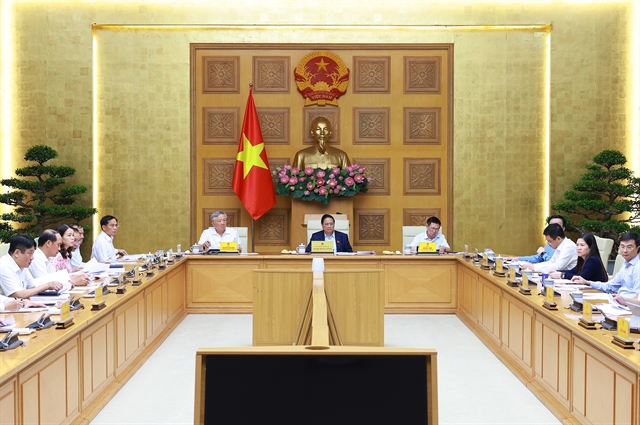 Politics & Law
Politics & Law


|
| Prime Minister Phạm Minh Chính (centre) chaired a Government meeting on responses to the recent escalation of conflict in the Middle East and other global developments. — VNA/VNS Photo |
HÀ NỘI — Prime Minister Phạm Minh Chính on Monday chaired a Government Standing Committee meeting with leaders of ministries and sectors to assess the situation and devise response measures to the recent escalation of conflict in the Middle East and other global developments impacting Việt Nam’s economic growth.
Attending the meeting were Permanent Deputy PM Nguyễn Hòa Bình, Deputy PMs Trần Hồng Hà, Bùi Thanh Sơn, Hồ Đức Phớc and Mai Văn Chính, ministers and heads of ministerial-level agencies, leaders of central agencies and major economic groups.
Following the outbreak of conflict in the Middle East – particularly the back-and-forth attacks between Israel and Iran, and the US strikes on Iran – a direct impact on the global economy can already be felt, including rising oil and energy prices, disruptions to global transport and trade, and increased inflation risks.
Việt Nam's economy will inevitably be affected, especially in terms of transportation and import–export activities, despite limited trade and investment relations with the Middle East – and specifically Israel and Iran, delegates noted.
Following discussions, PM Chính concluded that global developments remain complex and unpredictable, with potential continued impacts on the global economy, including Việt Nam – particularly regarding growth targets, supply and production chains, logistics, consumer demand and exchange rates.
The Government leader stressed that while the situation poses challenges, it also presents opportunities for Việt Nam to restructure its economy towards a greener, faster and more sustainable trajectory. He emphasised the need to reform markets, diversify products and reconfigure production along diversified supply chains.
He called on ministries, sectors, agencies, the public and businesses to build on the Government’s past experience in responding to challenges since the beginning of the term. He urged a calm, resolute and persistent approach to set objectives, proactive monitoring of developments and timely, appropriate and effective responses within each entity’s functions and authority. Matters beyond jurisdiction must be promptly reported to higher authorities.
PM Chính directed efforts to reinvigorate traditional growth drivers – investment, exports and consumption – and foster breakthroughs in new growth engines such as science, technology, innovation, the digital transformation and the green transition.
Reaffirming the Party and State’s consistent approach of building an independent and self-reliant economy with proactive, active, substantive and effective international integration, PM Chính called for the implementation of fiscal policies such as tax exemptions, deferrals and reductions in fees to ease burdens on citizens and businesses.
He also urged continued increases in revenue collection, expenditure cuts and the acceleration of public investment disbursement – particularly in strategic infrastructure – while eliminating unnecessary spending and ensuring effective outlays. Price and market control efforts must also be enhanced.
As for monetary policy, the PM called for flexible and prudent management, tightly controlled exchange rates and inflation regulation with timely, appropriate and effective measures. He stressed the importance of interest rate controls to ensure easier access to capital, along with efforts to curb speculation in gold and foreign currencies. Credit expansion must be controlled and prioritised for deep-processing industries, agriculture, exports and especially for supporting farmers.
“Fiscal and monetary policies must be closely coordinated – each must support the other,” PM Chính stated.
He also demanded that major economic balances be maintained, especially for food and energy security. Authorities must ensure market stability – particularly in food and fuel – and safeguard adequate food supplies for both domestic consumption and export. Agriculture, he emphasised, must always serve as the backbone of the economy under all circumstances. The PM also stressed the importance of maintaining stable fuel and electricity prices and ensuring information security –particularly in telecommunications networks.
He further instructed relevant bodies to accelerate negotiations for new free trade agreements, leverage existing agreements and enhance trade promotion, logistics reform and customs facilitation to help businesses reduce input and compliance costs. He reaffirmed Việt Nam’s consistent and determined stance in ongoing tariff negotiations with the US.
Domestically, efforts must be made to stimulate market development, especially consumer demand, to repair market disruptions. The PM called for the expansion of e-commerce, improved digital tax collection and further promotion of the 'Vietnamese people prioritising Vietnamese goods' campaign. Cultural and entertainment industries must also be fostered alongside tourism development.
He directed provincial and municipal People's Committees to swiftly stabilise the new two-tier administrative system, and urged ministries and sectors to actively promote decentralisation and delegation of authority, avoiding any operational gaps. He stressed the need to combat counterfeit and origin-less goods, especially fake medicines and food, and called for strengthened inspection and supervision efforts to help stabilise the market, expand production and business and develop the private sector.
Enterprises must also be mobilised to effectively implement the Politburo’s Resolution 68, as well as resolutions of the National Assembly and Government. Authorities are to review contingency budget resources to stimulate consumption and reduce unnecessary administrative procedures, while enhancing digital administration, supply and demand connections, investment attraction and trade and tourism promotion in a methodical and organised manner.
Ministries and sectors must maintain close and coordinated collaboration, and intensify public communication about national achievements to build public consensus and reassure investors – avoiding public panic, hoarding and speculation. All efforts must focus on overcoming challenges and achieving set objectives. — VNS




